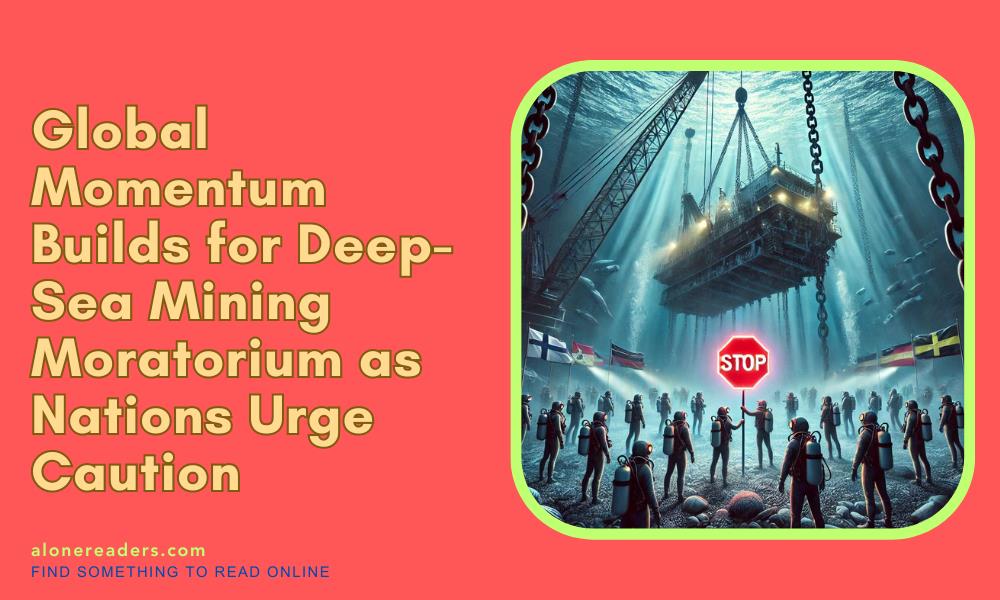
In a significant development on the global environmental stage, the International Seabed Authority (ISA) concluded a critical meeting with a mounting chorus of nations advocating for a moratorium on deep-sea mining. The conference, held in Kingston, Jamaica, witnessed impassioned debates, with countries and environmental groups pushing for a halt to the emerging industry, citing the potential irreversible damage to the marine ecosystem.
The ISA is an autonomous international organization established under the United Nations Convention on the Law of the Sea (UNCLOS). Its mandate includes regulating mineral-related activities in the international seabed area beyond national jurisdiction, known as "the Area." The organization is responsible for ensuring that these activities are conducted for the benefit of humanity while safeguarding the marine environment.
Deep-sea mining involves extracting minerals from the ocean floor, including valuable metals like cobalt, nickel, and rare earth elements, which are crucial for green technologies such as batteries for electric vehicles. However, this relatively new industry has raised alarm among scientists and environmentalists who warn that the environmental impacts are largely unknown and could be catastrophic.
The deep-sea environment is one of the most remote and least understood ecosystems on Earth. It hosts unique species that have adapted to extreme conditions, many of which are still undiscovered. Disturbances from mining activities, such as sediment plumes, noise pollution, and habitat destruction, could have far-reaching consequences, potentially leading to the extinction of species before they are even known to science.
At the recent ISA meeting, a coalition of countries, including Germany, France, Costa Rica, and several Pacific Island nations, voiced strong support for a moratorium on deep-sea mining. These nations argue that more time is needed to fully understand the environmental implications of such activities and to establish comprehensive regulations that can prevent ecological disasters.
"The ocean is our lifeblood," stated the representative of a Pacific Island nation. "We cannot afford to gamble with our future by allowing deep-sea mining to proceed without a thorough understanding of the risks."
Environmental organizations, such as Greenpeace and the Deep Sea Conservation Coalition, also played a significant role in advocating for the moratorium. They emphasized the precautionary principle, arguing that in the absence of conclusive evidence proving the safety of deep-sea mining, the activity should not be permitted to move forward.
While the push for a moratorium gained significant traction, not all parties were in agreement. Some countries, particularly those with vested interests in the mining industry, argued against the moratorium, citing economic benefits and the critical role of these minerals in the transition to a green economy.
The representative from a country with a large mining sector stated, "The minerals found in the deep sea are essential for the production of technologies that will drive the green revolution. We cannot ignore the potential for economic development and the benefits these resources could bring to our economies and the global effort to combat climate change."
Mining companies and industry groups also opposed the moratorium, arguing that with proper regulations and technological advancements, deep-sea mining could be conducted responsibly and sustainably. They stressed the importance of developing clear guidelines that would allow the industry to proceed without causing undue harm to the marine environment.
The ISA finds itself at a critical juncture as it balances the need for resource development with environmental protection. The organization has been working on developing a regulatory framework for deep-sea mining, but progress has been slow, and many details remain unresolved.
During the meeting, the ISA's Secretary-General acknowledged the growing global concern and emphasized the importance of a cautious approach. "The ISA is committed to ensuring that any deep-sea mining activities are conducted in a manner that is environmentally responsible and in the best interest of humanity," he said. "We must proceed with caution and prioritize the protection of our oceans."
The call for a moratorium has placed additional pressure on the ISA to deliver a robust and transparent regulatory framework. Some experts have suggested that the moratorium could be used as a temporary measure to allow for further scientific research and the development of more stringent environmental safeguards.
The outcome of the ISA meeting is expected to have significant implications for the future of deep-sea mining. If a moratorium is adopted, it could set a precedent for international environmental governance and signal a shift toward a more cautious approach to resource extraction in sensitive ecosystems.
However, the path forward remains uncertain. The debate over deep-sea mining highlights the broader challenge of balancing economic development with environmental conservation in an era of increasing resource demand and ecological awareness.
As the world continues to grapple with the environmental crises of our time, the decisions made by the ISA and its member states will be closely watched. The deep sea, often described as the last frontier, holds both great promise and great peril. How humanity chooses to explore and exploit this vast and mysterious region will shape the health of our oceans and, ultimately, the future of our planet.
Conclusion: A Crossroads for Ocean Conservation
The conclusion of the ISA meeting marks a pivotal moment in the global discourse on deep-sea mining. With a growing number of nations advocating for a moratorium, the world stands at a crossroads. The decision to halt or proceed with deep-sea mining will have far-reaching consequences, not only for the marine environment but for the global community as a whole.
As nations continue to debate the merits and risks of deep-sea mining, the voices calling for caution are growing louder. Whether these calls will lead to meaningful action remains to be seen, but one thing is clear: the future of the deep sea, and the countless species it harbors, hangs in the balance.